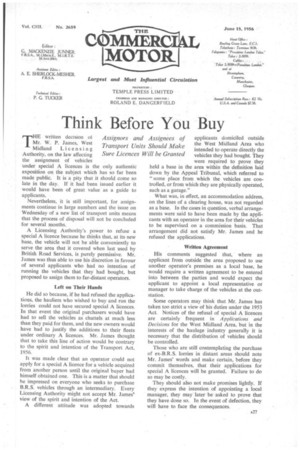Think Before You Buy
Page 29

If you've noticed an error in this article please click here to report it so we can fix it.
THE written decision of Mr. W. P. James, West Midland Licensing Authority, on the law affecting the assignment of vehicles under special A licences is the only authentic exposition on the subject which has so far been made public. It is a pity that it should come so late in the day. If it had been issued earlier it would have been of great value as a guide to applicants.
Nevertheless, it is still important, for assignments continue in large numbers and the issue on Wednesday of a new list of transport units means that the process of disposal will not be concluded for several months.
A Licensing Authority's power to refuse a special A licence because he thinks that, at its new base, the vehicle will not be able conveniently to serve the area that it covered when last used by British Road Services, is purely permissive. Mr. James was thus able to use his discretion in favour of several applicants who had no intention of running the vehicles that they had bought, but proposed to assign them to far-distant operators.
Left on Their Hands He did so because, if he had refused the applications, the hauliers who wished to buy and run the lorries could not have secured special A licences. In that event the original purchasers would have had to sell the vehicles as chattels at much less than they paid for them, and the new owners would have had to justify the additions to their fleets under ordinary A licences. Mr. James thought that to take this line of action would be contrary to the spirit and intention of the Transport Act, 1956.
It was made clear that an operator could not apply for a special A licence for a vehicle acquired from another person until the original buyer had himself obtained one. This is a matter that should he impressed on everyone who seeks to purchase B.R.S. vehicles through an intermediary. Every Licensing Authority might not accept Mr. James' view of the spirit and intention of the Act.
A different attitude was adopted towards applicants domiciled outside the West Midland Area who intended to operate directly the vehicles they had bought. They were required to prove they held a base in the area within the definition laid down by the Appeal Tribunal, which referred to "some place from which the vehicles are controlled, or from which they are physically operated, such as a garage."
What was, in effect, an accommodation address, on the lines of a clearing house, was not regarded as a base. In the cases in question, verbal arrangements were said to have been made by the applicants with an operator in the area for their vehicles to be supervised on a commission basis. That arrangement did not satisfy Mr. James and he refused the applications.
Written Agreement His comments suggested that, where an applicant from outside the area proposed to use another operator's premises as a local base, he would require a written agreement to be entered into between the parties and would expect the applicant to appoint a local representative or manager to take charge of the vehicles at the outstation.
Some operators may think that Mr. James has taken too strict a view of his duties under the 1953 Act. Notices of the refusal of special A licences are certainly frequent in Applications and Decisions for the West Midland Area, but in the interests of the haulage industry generally it is necessary that the distribution of vehicles should be controlled.
Those who are still contemplating the purchase of ex-B.R.S. lorries in distant areas should note Mr. James' words and make certain, before they commit themselves, that their applications for special A licences will be granted. Failure to do so may be costly.
They should also not make promises lightly. If they express the intention of appointing a local manager, they may later be asked to prove that they have done so. In the event of defection, they will have to face the consequences.




































































































